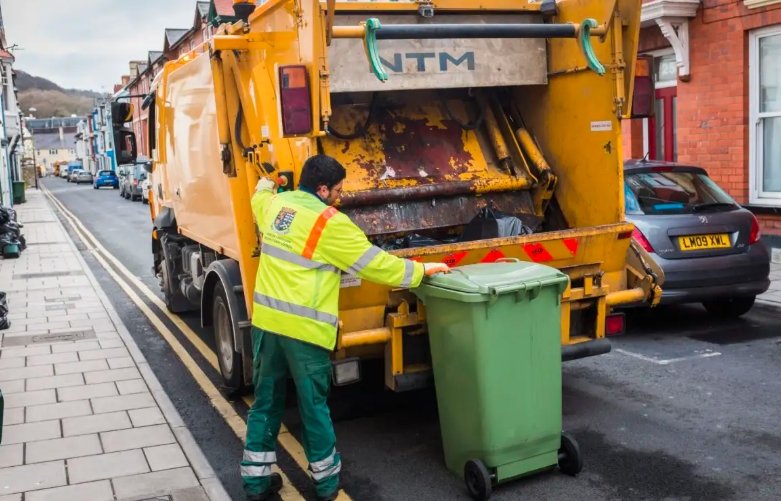A sweeping new landfill ban will kick in on December 31. But with no clear plan for where all the rubbish will go, Scotland may be forced to export its waste — by the truckload.
Scotland is staring down a garbage dilemma that’s fast approaching a national embarrassment. In just over six months, the country will outlaw the dumping of household and commercial “black bag” waste in landfills. But there’s a snag — there’s nowhere near enough incinerators or recycling infrastructure ready to deal with the fallout.
And that means Scotland could be sending up to 100 trucks of waste every single day across the Border to England. Or even further — to Scandinavia.
A ban years in the making, but not in the solving
This isn’t a bolt from the blue. The landfill ban was originally scheduled for 2021, part of a broader climate commitment by the Scottish Government. It was then delayed due to the pandemic, giving councils and the waste industry extra time to prepare.
But they didn’t.
Now, with the clock ticking down to December 31, industry experts are sounding the alarm. David Balmer, a senior figure at ERS Remediation, called the current situation “borderline farcical.”
“We’ve had years to sort this,” he told MailOnline. “And now we’re looking at sending hundreds of tonnes of black bag waste to England or, in some cases, Scandinavia. It’s not a solution — it’s a stopgap, and not a great one.”

What’s being banned — and why?
The legislation specifically targets unsorted, non-recyclable household and commercial waste — what most people throw in their general bin. That kind of rubbish makes up a big chunk of landfill content.
The idea behind the ban is clear: reduce emissions, stop burying usable materials, and drive up recycling rates.
But in practice, it’s revealed a gaping hole in Scotland’s waste infrastructure.
-
There are only five operational energy-from-waste (EfW) incinerators in Scotland.
-
Planned projects have been delayed, cancelled, or faced local opposition.
-
Recycling rates have flatlined in many areas over the past three years.
Daily convoys of trash
The logistics are grim. If Scotland can’t process its own rubbish, the only option is to export it — within the UK or beyond.
Waste industry insiders estimate that up to 100 lorries a day could be required to transport excess waste south to English incinerators, where there is still spare capacity. Each truck can carry around 20 tonnes.
That means around 2,000 tonnes of waste shipped across the Border every day.
One veteran haulier described the plan as “environmental madness disguised as green policy.” The irony hasn’t been lost on critics — reducing landfill to lower emissions by… trucking thousands of tonnes of waste across hundreds of miles.
And let’s not forget, England doesn’t exactly have unlimited capacity either. If the English plants hit their limit, or local councils push back, Scotland may be forced to look even further afield — to Sweden, Norway, or Denmark, where energy-from-waste capacity is high but transportation costs (and emissions) even higher.
The cost? Eye-watering.
Exporting rubbish is not cheap — and Scottish taxpayers could end up footing the bill.
One waste management source estimated that cross-border haulage and incineration fees could cost £150–£200 per tonne, compared to £70–£90 for landfill.
Let’s break that down with rough maths:
| Scenario | Tonnes per day | Cost per tonne | Total Daily Cost | Annual Estimate (350 days) |
|---|---|---|---|---|
| Cross-border export to England | 2,000 | £175 | £350,000 | £122.5 million |
| Landfill (old model) | 2,000 | £80 | £160,000 | £56 million |
That’s a difference of over £66 million per year, not counting the cost of building new domestic incinerators or investing in new recycling infrastructure.
And these figures assume that England — or Scandinavia — will continue accepting the waste indefinitely. That’s a gamble.
Warnings of a ‘Birmingham-style’ garbage crisis
Industry experts are painting a bleak picture if Scotland fails to act fast. David Balmer warned of scenes similar to Birmingham, where bin strikes and collection backlogs recently led to images of waste piling up in the streets.
“It doesn’t take long,” he said. “A few missed collections, and the backlog grows exponentially. Once it gets out of hand, it stays out of hand.”
Some Scottish cities — including Glasgow — are already grappling with fly-tipping and underperforming waste systems. Add in a hard landfill ban with no real backup plan, and you’ve got a recipe for chaos.
What’s the government saying?
Scottish ministers are sticking to the plan.
The Scottish Government insists the landfill ban is a vital step toward net-zero targets. A spokesperson said they were working “closely with local authorities and industry stakeholders” to support the transition.
But critics say the messaging is vague, and the solutions even vaguer.
“We’ve had statements. We need a plan,” said one waste contractor who services multiple councils in the Central Belt.
Calls for emergency measures
Some council leaders are now quietly lobbying Holyrood for a temporary reprieve — a phased ban, not a hard stop.
Others want urgent investment in “waste hubs” — temporary facilities where rubbish can be sorted, stored, or baled before export.
There’s also growing pressure on the Scottish Government to fast-track stalled incinerator projects, despite environmental groups lobbying against them.
In short, the country’s running out of time. And options.


















